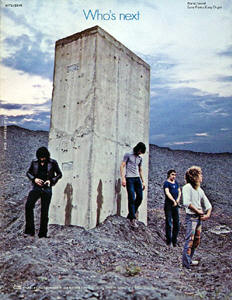
Our president, doing what I believe to be a riff on The Who's "We Won't Get Fooled Again."
Priceless.
"There's a lot of talk about Iraq on our TV screens, and there should be, because we're trying to figure out how best to make the world a peaceful place. There's an old...saying in Tennessee...I know it's in Texas, probably in Tennessee that says Fool me once...(3 second pause)... Shame on...(4 second pause)...Shame on you....(6 second pause)...Fool me...Can't get fooled again.” – George W. Bush to Nashville, Tennessee audience, Sept. 17, 2002, MSNBC-TV
Audio, video and official White House text:
Comedy Central
http://www.comedycentral.com/includes/rpmdirect.jhtml?ram=dailyshow/headlines/7034_headline_300.rm
MSNBC tries to make real news out of the gaffe.
http://msnbc.com/m/c/ctv_emailthis.asp?id=nn_mitchell_iraq_020917%26subid=%26sl=%260mw=x92
Official White House Transcript
http://www.whitehouse.gov/news/releases/2002/09/20020917-7.html
Life As A Bush Speechwriter - As Seen By Poofle
http://www.poofle.com/archives/2002_09_19.html
Monday, September 30, 2002



 0 comments 0 comments


Catch
Rhythmic sounds are generated by rectilinear forms as they traverse the surface of the screen. Through a process of additive synthesis, sinusoidal waves are combined to produce a fluid soundscape.

Cells
Cells of color navigate through an abstract architecture to create an active ecology. As the user defined architecture changes, the autonomous objects redirect their movements, thus modifying the composition.
Group C
http://www.groupc.net
Thursday, September 26, 2002



 0 comments 0 comments


Google News
http://news.google.com/
I've been using Google News for months ... It is now better than ever. If you are looking for Op-Ed pieces, stick with The New York Times. If you are looking for a well-compiled aggregation of news stories from 4000 news sources around the world, try Google News. Why is it cool? Well, there are many reasons ... Here are a few:
- Google indicates the time of the last update to the story/news section. Ok, there is nothing very new here. However, those updates are usually between 2 minutes and 1 hour old. Now that is pretty cool.
- Since Google aggregates headlines, you get multiple sources for the same story ... Skeptical about the bias of a particular journalist or news source? Just click on one of the other sources to see their point of view.
- Straight-forward design. Like all Google services, the pages are easy to read and fast to load.
What's missing? Lots! But, that's part of the fun, right? We get to watch it grow - just like the Google Image Search. (Remember when that was just getting started and you wondered if it would work?) So, what else should Google News have? Here are two ideas ...
1. Blog News (or Daypop with a Google twist.) Besides the regular indexing of frequently updated blogs, Google has yet to really tap the power of this publishing technology. The influence of weblogs on the news and the way we see it (at least online, for now) should not be underestimated, and I believe it will only get stronger over time.
2. Op-Ed aggregation ... How nice would it be to see Tom Friedman's daily columns paired next to William F. Buckley's, especially if they are dealing with the same subject. Or, how about a daily topical review and comparison of The National Review, The New York Times, The Weekly Standard, and The Washington Post's op-ed pieces?
So, there you have it ... I've officially switched from Moreover.com's service to Google. Sorry Nick, but you're thing had potential. Too bad you let it go down the drain. As for Daypop, we'll have to see. For the moment, they're out of disk space ... a problem I don't think Google will have any time soon.
Google's New Service News to Yahoo
VentureReporter.net
Tuesday, September 24, 2002'
Google's news service, unveiled on Monday, has all the top stories you can find on just about any online news service. In fact, it's missing just one thing: the human editor. The New York Times reported today that Google's new service uses search algorithms to automatically sort through online news services and come up with relevant headlines for its front page. And while human editors may not yet be worried about the competition, it seems that the other internet portals are.
According to industry executives cited in the Times article, the relationship between Google and Yahoo is becoming strained. Yahoo was an early investor in Google and continues to use Google's search technology for its portal, but is unhappy with Google's recent forays into online shopping and news services, traditional moneymakers for Yahoo.
Google co-founder Larry Page claims that Yahoo cooperated with Google's plans for a news service, and the site currently features articles from Yahoo Headlines among its offerings. However, as the Times article points out, Yahoo has removed the Google logo from its search engine.
For more, see The New York Times' article
http://www.nytimes.com/2002/09/24/technology/24GOOG.html
(free registration required)
Wednesday, September 25, 2002



 0 comments 0 comments


The Internet Goes to College
The Pew Internet Project
CHICAGO (September 15, 2002) – The generation that grew up with the personal computer now is heavily wired on campus and relies on the Internet in every dimension of college life. Fully 86% of college students use the Internet, compared to 59% of the overall U.S. population, and the students say the Internet is essential to their academic and social lives.
Among the key findings in a report from the Pew Internet & American Life Project titled, “The Internet Goes to College”:
79% of college Internet users say the Internet has had a positive impact on their college academic experience.
73% use the Internet more than the library for research.
72% check their email every day.
60% think the Internet has improved their relationships with classmates.
56% believe that email has enhanced their relationship with professors.
46% say email enables them to express ideas to a professor that they would not have expressed in class.
The report notes that surveys by the Pew Internet Project show college students are much more likely than other online Americans to use instant messaging, download music files, share music files from their hard drive, and browse the online world just for fun. They also use the Web and email to get assignments from professors, form virtual study groups, plan term projects, discuss their grades with their teachers, and even to see if the materials they want at the college library are available.
“Today’s college students were born around the time the first PCs were introduced to the public and they have grown up with these technologies,” said Prof. Steve Jones, lead author of the study and head of the department of communication at the University of Illinois at Chicago. “To them, the Internet and email are as commonplace as telephones and television – and equally as indispensable.”
Other findings of the report include these:
42% of online students say they use the Internet most often to keep in touch with their friends; 38% say they use it most often for academics.
As for email, 72% correspond mostly with friends; 10% mostly with family; 7% mostly with professors.
College Internet users are twice as likely as other Internet users to have ever downloaded music files when compared to all Internet users: 60% of college Internet users have done so compared to 28% of the overall population.
College Internet users are twice as likely to use instant messaging on any given day compared to the average Internet user. On a typical day, 26% of college students use IM; 12% of other Internet users are using IM on an average day.
“The students made clear that the Internet is the information cornerstone of their lives – not just on school projects but on every subject that matters to them,” said Jones. “The reason we care is that these students will be taking their online habits and expectations into their lives after college and that will likely lead to significant changes in work and leisure.”
Professor Jones is a senior research fellow at the Pew Internet & American Life Project and a co-founder of the Association of Internet Researchers.
The Pew Internet & American Life Project is a non-profit, non-partisan research organization fully funded by the Pew Charitable Trusts to examine how Internet use affects families, communities, health care, education, civic/political life, and the work place.
The Internet Goes to College:
How Students are Living in the Future with Today's Technology
http://www.pewinternet.org/reports/toc.asp?Report=71
Tuesday, September 17, 2002



 0 comments 0 comments


Review by Tara Calishain or Research Buzz.
ArtAtlas operates as an index of international galleries. Their intention is to provide information about gallery locations for patrons, and a way for galleries to reach art seekers with updates on exhibitions and artists. This site has more than 5000 galleries listed in its database. You also have the option of viewing it in English or German.
Galleries can be searched by name, city, artist or keyword. When two city searches were unsuccessful, I elected to take another route and browse the list of cities, which opens to countries ranging from Argentina to Venezuela. I clicked on the United States and found more than seven hundred options to choose from. Each option opens to provide an address and phone numbers, along with a note about what type of Art you will find at the gallery. The word "WEB" beside the name links to the gallery's Web site.
ArtAtlas
http://www.artatlas.com/
Friday, September 13, 2002



 0 comments 0 comments


Reflections on an America Transformed
by Tony Kushner
Change is not the substitution of one static state for another. The meanings of Sept. 11 continue to be fought over, and the prevailing interpretations will direct future action. Colossal tragedy has made available to America the possibility of a new understanding of our place in the world.
Tragedy's paradox is that it has a creative aspect: new meaning flows to fill the emptiness hollowed out by devastation. Are we dedicated to democratic, egalitarian principles applicable to our own people as well as to the people of the world? And do we understand that "our own people" and "the people of the world" are interdependent? Will we respond with imagination, compassion and courageous intelligence, refusing imperial projects and infinite war?
The path we will take is not available for prediction. We ought not to believe columnists, think-tank determinists or the cowboy bromides of our president and his dangerous handlers and advisers. We, the citizenry, are still interpreting.
Our conclusions will then force our reinterpretation. Urgency is appropriate but not an excuse for stupidity or brutality. Our despair over our own powerlessness is simply a lie we are telling ourselves. We are all engaged in shaping the interpretation, and in the ensuing actions, we are all implicated.
Tony Kushner's most recent play is "Homebody/Kabul."
Wednesday, September 11, 2002



 0 comments 0 comments

|





 0 comments
0 comments









